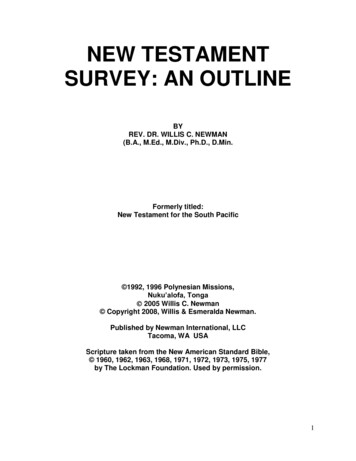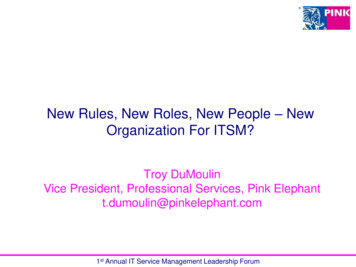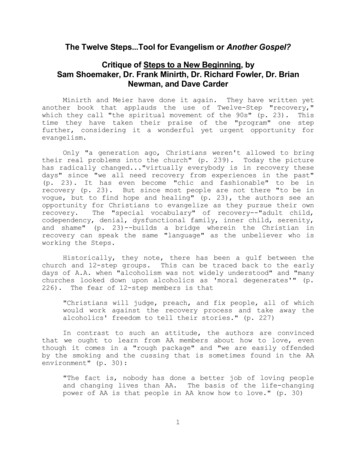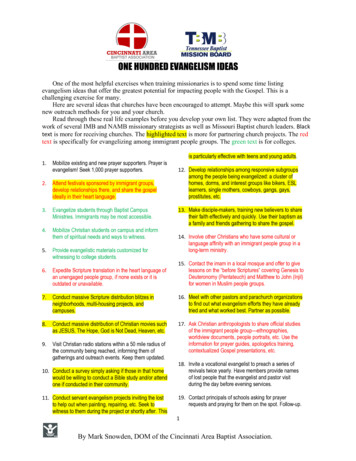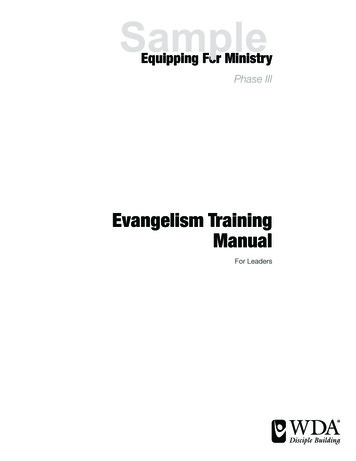
Transcription
Evangelism HandbookOf New Testament Christianity-"-,. .'Phil SandersCopyright Phil SandersDecember 2009In Search of the Lord's WayPO Box 371, Edmond, OK 73083phil@searchtv.org405-348-3242
PrefaceIn 1992 five members ofthe Walnut St. Church of Christ traveled to Minsk, Belarus, to teach thegospel to this republic of former Soviet Union. We entered a republic that had forsaken the knowledge ofGod for seventy years. We knew we had a challenge to teach for long hours. Knowing our ownweaknesses we sought a resource to help us face the many questions awaiting us.Since no single book in addition to the Bible fit the challenge, we decided to create our own. Wewanted a concise, concentrated reference book that would cover many subjects adequately for the task.When we could find no single book in our library, we sought to make a notebook with many articles on avariety of topics. Since the first notebook was poorly arranged, we determined to organize and completethe project for future campaigns. From 1992 to the present, the Evangelism Handbook grew in form andcontent. Its sole purpose was to provide quick reference material to those who evangelize and teach.Through the years we have provided thousands of copies to teachers and soul-winners in Americaand in many foreign countries. Since this book has been on the internet, it has been downloaded manythousands of times. The author has freely shared this material and has no intent to sell it. It is copyrightedand should not be sold by others. Those who use it may freely copy materials so long as they remainunchanged and proper credit given. Please let me know of your use or distribution of these materials.There can be no more noble work than preaching the gospel and persuading men to follow Christ.God had only one Son, and He was an evangelist. He preached repentance, for the kingdom of heaven isat hand (Mt. 4: 17). Though the kingdom is now here in the church (Col. 1: 13-14), we must still appeal tomen to repent of their sins and to enter the kingdom through baptism (John 3:3-7; 1 Cor. 12: l3; Gal. 3:2627). The effective evangelist will spare no effort to prepare his heart and mind for the task. We pray thisvolume may offer help in that preparation and pursuit.We offer this resource to all who, "knowing the fear of the Lord," would persuade others oftheunsearchable riches in the grace of God. Mayall that we do be done to His glory and honor.We offer our thanks to Pollock Printing for the printing of this book. We give our thanks to thechurches of the Parkersburg, West Virginia, area for their foresight to have a campaign and prompt theprinting of this book.December 8, 2009Phil Sanders
iTable of ContentsPageOne: Evangelism MethodsThe Conversion Process"Upon the Rock" Bible Study SeriesMotivating People to Obey the GospelCrucial Questions Converts AskReaching Those Who Have Fallen Away18192122Two: GodWho is God?Jesus ChristThe Holy SpiritThe TrinityMaking God in Our ImageDoes God Want Men to Worship with Images and Icons252628293031Three: Christian EvidencesEvidences for the Existence of GodDesign and Purpose ArgumentsSome Positive Evidence of the ResurrectionThe Historicity of JesusBiblical InspirationCan We Trust the New Testament?You Can Trust Your BibleArgument for the Genuineness of the DocumentsMessianic PropheciesProphecies of the Sufferings of the MessiahProphecies of Isaiah 53Facts of Astronomy, Cosmology, and the BibleThe Medical Accuracy of the BibleScientific Fact or Principle in the BibleThe Problem of SufferingWhy Does God Allow the Innocent to Suffer?Was It Morally Right for God to Order the Killing of the Canaanites?The Risk of BelievingAgnosticism and Its Four: SalvationWhat is sin?What Sin Will DoThe Nature of ManWhat is the Grace of GodThe Nature and Need for RepentanceWho Is a New Testament Christian?Is Baptism Necessary to Salvation?Acts 2:38Baptism among the Early Church FathersTimeline in the History of BaptismBaptism--A Dividing LineWhat Will Happen to Good but Unbaptized PeopleAre Infants to Be Baptized?Are Babies Born in Sin?6467686870727476778081818282
iiGod's Second Law of Pardon for ChristiansThe Conditional Security of BelieversIs Man Predestined?How Many Baptisms Do We Have Today?Is Baptism in Water or in the Spirit?Baptism before Salvation: Wise or foolish?Examples of Conversion84858687888889Five: The ChurchWhat Is the Church?Why Becoming a Member of the Lord's Church is NecessaryOrganization of the ChurchWhen Was the Church-Kingdom Established?The Falling Away and the RestorationDenominational Churches and Their OriginThe Undenominational Nature of New Testament ChristianityWhich Concept is Scriptural?Can We Restore the New Testament Church?The Unity of the ChurchDoes the New Testament Contain Patterns for the Church?9091919293939495959798Six: Christian WorshipThe Nature of WorshipPrayer is Man Speaking to GodThe Lord's SupperGiving to GodDoes the Bible Authorize Christian Worship with Musical InstrumentsThe Sabbath and the Lord's DayThe Early Church and the Sabbath DayDoes the Bible Authorize Women to Lead Men in the Worship of the Church?101102103104104108110112Seven: The BibleIntroduction to the BibleDigging Deeper into My BibleThe Need for an Overall ViewFifteen Periods of Bible HistoryGeneral Outline of BibleComments About the BibleUnderstanding the Old and New TestamentsMust We Have Bible Authority?Can We All Understand the Bible Alike?Why Men Differ in Understanding the BibleBasic Rules of Bible Study115116117118119120121123124125126Eight: Christian LivingWhy I Attend All the Meetings of the ChurchLord, Help Me Through TodayThe Ways Satan is Attacking UsIf I Were the DevilGod's People Know How to Get AlongThe Pursuit of ExcellenceGod's Answer's to Man's ConcernsThe Providence of GodThe Temptation Trap130130132133134136137138140
iiiDealing with AngeRecharge Your Spiritual Battery142145Nine: The Supernatural and Last ThingsThe Immortality of the SoulThe Soul after DeathWhat Happens at Death?When Jesus Comes AgainThe Second Coming of ChristThe JudgmentWho Will Be in the Judgment?Is Man Reincarnated?Purgatory is Not a Biblical ConceptA Citizen of HeavenThe Doctrine of 153153155155158Ten: False TeachingsHow Can I Know the Truth?Contend for the FaithCharacteristics of CultsAstrologyDoes Anyone Have Miraculous Gifts Today?BuddhismHinduismIslamCatholisicmThe ApocryphaBook of Mormon and the BibleMormon ven: GlossaryTwelve Lesson Evangelistic Study:1. God2. Jesus3. Evidences for Resurrection4. What Sin Will Do5. The Need for Repentance6. Who is a New Testament Christian?7. Is Baptism Essential8. What is The Church?9. The Nature of Worship10. Prayer--Man speaking To God11. Must We Have Bible Authority?12. The Immortality of the SoulTwelve-Lesson Follow up Study:1941. You Can Trust Your Bible2. Crucial Questions You May Be Asking3. God's Second Law of Pardon4. The Conditional Security of Believers5. The Undenominational Nature of Christianity6. Does the NT contain patterns for the Church?7. The Lord's Supper8. Understanding the Old ad New Testament9. Why I attend Church10. The Temptation Trap11. Recharging Your Spiritual Battery12. God's People Know How to Get Along
Evangelism Handbook: Conversion Process1THE CONVERSION PROCESSComing out the world and becoming afruitful Christian is a process in which there aremany steps. Occasionally, a method ofevangelism is developed that centers on the stepsof salvation and does not give properconsideration to the changes that must take placein the heart and mind of a person before he isready to believe, repent and obey. Nor do somemethods of salvation consider the things thatmust happen in order for a person to become afunctioning part of the body of Christ so that hemay produce fruit. This section will discuss thepre-conversion changes and the post-conversionchanges of a new disciple of Christ.Discipleship is an unending processwhereby a believer submits to the Lordship ofJesus Christ and lives in such a way that thisprofession permeates every aspect of his life.One begins the process of discipleship at thetime he decides to follow the Lord’s way.Salvation comes at the point of obedience to thegospel by submitting to baptism in water for theremission of sins. But God expects the discipleto be taught ‘to obey everything I havecommanded you” (Matt. 28:19). The work of theevangelist is not done at the waters of baptism.The one completely safe and dependable manualon personal evangelism is the New Testament;yet the more one studies the New Testament, theless one can deduce from it a system of personalevangelistic methods. Jesus employed a differentapproach with different persons. He assessedtheir needs and spoke to them on the basis oftheir understanding. One might take for exampleJesus’ approach to Nicodemus as being verydifferent from his approach to the woman at thewell. Paul made a much different appeal at MarsHill than he did at Agrippa’s court or atEphesus. Circumstances differ, and theevangelist must be prepared to approach hislisteners in such a way as to speak to theirunderstanding of God. It is hoped that thissection will serve as a measuring stick for theevangelist to evaluate his students and to knowwhere to begin to speak to their spiritual needs.The task of the evangelist is not merely toinform his students of the gospel story; it is alsoto persuade them to accept and obey the gospel.“Knowing therefore the fear of the Lord, wepersuade men,” Paul says (2 Cor. 5:11). Theevangelist must not only know the story, hemust also know how to make the story pierce thehearts of those who are listening in the hope thatthey will respond. Knowing why one mustrespond is surely as important as knowing whatone must do to be saved. With this in mind, let’sconsider these steps or tasks that are part of theconversion process. Each step has a crucial placein the process. Soil must be prepared before onemay plant the seed and expect a fruitful harvest.The planted seed must be watered and protectedif it is to grow. The harvested fruit must be caredfor and stored before it is ready to eat.PRE-CONVERSION TASKSConversion is the change of the wholeperson: the intellect, the emotions and the will.These three inter-related aspects of the heart areimportant in knowing how one changes. It takestrue change in all three areas for conversion totake place. Conversion is a change in what onebelieves; it is repentance; and it is a change inone’s love.I. In Relation to God1. The student must realize the existence ofGod. (Intellect)God made His “eternal nature and divine power”known through the world that He has created(Rom.1:l8-21). Yet there are many hearts thathave been darkened by not acknowledging orgiving thanks to God. Evangelists need to knowenough about Christian evidences todemonstrate that God exists beyond a reasonabledoubt. The Christian evidences section of thisbook will be helpful. Further, the student mustrealize that the one true and living God is theGod of the Bible. The apostle Paul at Mars Hillspoke to men who believed there were gods andworshiped idols but did not know the true God.It is not enough to believe there is a God if thatGod is some other than the God of the Bible.Evangelists may need to address the fact tat Godis a Person, that He is Spirit, that He is Infinitein power, or that He is unique. The evangelist
Evangelism Handbook: Conversion Process2must respond to the modern tendency in ourworld toward a pluralistic theology (believing inany god, for one god is as good as another). Hemust be able to give a reason why Jesus Christ isthe only way to heaven, and Mohammed orConfucius is not.2. The student must have a favorableattitude toward God. (Emotions or Heart)The problem of human suffering is a difficulthurdle for many people. One may believe thatthe God of the Bible is the one, true God; yetone might be angry at God or hold a low view ofGod because of the suffering one hasexperienced or observed. It is necessary for theevangelist to be able to help the studentovercome this hurdle in order for the student toembrace God in submission and love.Furthermore, the student must come tounderstand how much God has love and blessedhim throughout his life. We love, because Hefirst loved us (1 John 4:19). There is no greaterlove than that of God nor more powerfulmotivation than the message of the cross. Thelove of God must motive the student to want tochange. God’s kindness should lead one torepent (Rom. 2:4).3. The Student must Submit to the Authorityof God and the Lordship of Christ. (Will) Thecall of Jesus for obedience abounds in the NewTestament. Among them are Matt. 7:21-23 “Noteveryone who says to me, ‘Lord, Lord,’ willenter the kingdom of heaven; but who does thewill of my Father, who is in heaven.” John 3:36“He who believes in the Son has eternal life; buthe who does not obey the Son shall not see life,but the wrath of God abides on him.” John 14:15“If you love Me, you will keep Mycommandments” Heb. 5:8,9 “although He was aSon, He learned obedience from the thingswhich He suffered; and having been madeperfect, He became to all those who obey Himthe source of eternal life.”Jesus taught that a personal commitmentmust be made to Him as Lord. On the last dayall men will bow the knee and confess JesusChrist is Lord to the glory of the Father (Phil.2:5-11). The Lordship of Christ means that webelong to Him and that He has a right to makedecisions affecting our lives. We are to denyourselves, to take up our crosses daily, and tofollow Him (Luke 9:23).In Relation to Sin and Self:1. The student must have an understandingof what sin is and the consequences of his ownpersonal sin. (Intellect)The message of the cross must not only show thelove of God for mankind but also the Lord’sutter abomination for sin. The wages of sin hasalways been death (Rom. 6:23), an eternaldamnation. Sin is the enemy of every man. Eachstudent must understand that sin is the violationof God’s law (1 John 3:4), and that God takesthat violation seriously. It is a momentousoccasion in the life of any person when hecomes to acknowledge that he has sinned againstGod and that God will hold him responsible.People will not change until they want tochange, until that change is seen as beneficial interms of their basic needs and desires. They needto understand that their sins have consequencesin this life, and that no one escapes theconsequences of his sin (Gal. 6:7,8). The life ofthe transgressor is indeed hard (Prov. 13:15). Hemust clearly see that by his own sin he has hurtGod, hurt others and hurt himself. He mustbecome sorry for his sins, that the sorrow mightlead him to repentance (2 Con 7:8-10).In a relativistic society, many people have noconcept of an objective standard of sin. They toooften consider themselves as ‘good peoplebecause they have not committed some horriblecrime (murder, rape, adultery, treason, etc.).They tend to justify their small sins (white lies,petty thefts, etc.) as human mistakes but notworthy of eternal damnation. It should notsurprise the evangelist to hear someone say, “Ihaven’t ever sinned,” since many people havesuch a limited view of what sin is. Some havedismissed the concept of sin altogether. Thereare those who cannot see any moral wrong in theNazis’ killing of six million Jews. In somesocieties people do not see the wrong of sin.They believe that if they have not hurt anyonewith their behavior, then they have not sinned.The concept of sin has been removed from somevocabularies. We hear of “victimless crime” andone’s right to do whatever one wishes as long asone doesn’t harm anyone else. This
Evangelism Handbook: Conversion Process3permissiveness is in reality lawlessness. Therecan be no sin where there is no breaking of thelaw (Rom. 4:15). If one does not like the law oragree that it should be a law, then one must takeaway its force as a law. This, some imagine, willjustify one’s behavior. The deceitfulness of sinis in its effort to justify itself. The evangelistmust be aware of this scheme of the devil todeceive men and so rob them of the truth. Thegospel will make little sense if a person has nounderstanding of morality. The evangelistcannot assume that his student feels guilt for hissins.2. The student must have a change of hearttoward sin and have hope in God to overcomethe sin problem. (Heart or Emotions)Embracing Jesus Christ means that I must dealwith my desire or love for sin. One cannot loveGod and Mammon. One cannot hold to sin andstill love God. James asked, “do you not knowthat friendship with the world is hostility towardGod? Therefore whoever wishes to be a friendof the world makes himself an enemy of God”(4:5). John said, “Do not love the world, nor thethings of the world. If any one loves the world,the love of the Father is not in him” (1 John2:15). The person who loves the Lord learns tolove the things of God and to despise sin. Sin isan enemy to all mankind. Rom. 12:9 admonishesus to “Abhor what is evil; cleave to what isgood.” Changing our attitudes toward sin maylead to a change in friends. A person whorepents to follow Christ may find that impenitentand rebellious friends are no longer willing toassociate with him. Peter observed, “For thetime already past is sufficient for you to havecarded out the desire of the Gentiles, havingpursued a course of sensuality, lusts,drunkenness, carousals, drinking parties andabominable idolatries. And in all this, they aresurprised that you do not run with them into thesame excess of dissipation, and they malignyou” (1 Pet. 4:3,4). Changing my moral life byadmitting and repenting of my sins is not an easything to do. Many people would rather doanything than admit their guilt. The dynamic ofguilt is a serious one for a person consideringbecoming a Christian. An individual’srealization that he is guilty of sin and lostdisturbs, alarms and frightens. He knows that hehas sinned and that he is weak to sin. He maywonder if he can overcome sin. There are somesins a person can forsake in a day and others thattake years. The student has been told he mustforsake his old way of life. He may have triedbefore on his own and failed. He may not thinkhe can overcome the temptations to continue insin. With some students the evangelist will havea hard time convincing them that sin exists, andwith others he will struggle to convince themthat God can help them overcome their sin traps.The evangelist must help the student realize thathe does not act alone in repentance, but that Godwill be his helper. Passages such as I Cor. 6:911; 10:13 and 1 Tim. 1:12-16 are beneficial ingiving hope. God is faithful and will help usovercome whatever temptations we face. Onecan do all things through Christ who strengthenshim (Phil. 4:13).3. The student must determine to leave sinand to embrace righteous living. (Will)The call to repentance is twofold: (1) it is adetermination to leave sin behind; and (2) it is adetermination to embrace righteous, Christianliving. His heart and will turns away from sinand toward Christ. He now loves the Lord andeverything associated with the Lord, and sinfulthings have become disgusting and repugnant.He applies these feelings and determinations tothe world and to himself. He seeks to become anew man “who is being renewed to a trueknowledge according to the One who createdhim” (Col. 3:10).Repentance begins with a sorrow for sinagainst God (2 Cor. 7:10), for his sins againstothers (Matt. 18:6-9), for his sin which hurtshimself (Psalm 32:1-5; 5 1:3-7), and for the falseteachings he believed or taught (2 Tim. 2:17; 2John 9-11). Repentance is not only a turningaway from sin; it is also a turning toward God.The changed sinner wants a clean heart (Psalm51:10). He leaves the far country and comeshome to the Father (Lk. 15:11-24). A change oflife and behavior complete repentance. Jesustold the woman caught in adultery to “go and sinno more (John 8:11). Paul told Agrippa that hetaught the Gentiles that “they should repent andturn to God, performing deeds appropriate torepentance” (Acts 26:20). The penitent son ofthe vineyard owner changed his mind and went
Evangelism Handbook: Conversion Process4to work in the vineyard (Mt. 2 1:28-30).Christians do not merely talk the talk, they walkthe walk. James urged Christians, “Do notmerely listen to the word, and so deceiveyourselves. Do what it says” (James 1:22). Noone is blessed who sees that there is a need tochange but fails to make that change (James1:25; 4:17).III. In Relation to Christian Living and theChurch1. The student must form and change hisbeliefs and attitudes concerning Christ andthe church. (Intellect)Beliefs are the ideas that an individual holds tobe true. Every person has basic beliefs, whichinfluence the way in which he looks at life andhow he behaves and relates to others. Secularvalues are different from sacred ones. One whoembraces God will find that when God is addedto the picture, every aspect of his life willchange (2 Cor. 5:16,17). All things have indeedbecome new. Some examples of the attitudeswithin a secular belief system include theseideas:God, if He exists at all, is just an impersonal,moral force.There are no absolute moral values.Man basically has the capacity within himselfto improve morally and make the right choices.Happiness consists of unlimited materialacquisition.There really is no objective basis for rightand wrong.The supernatural is just a figment ofsomeone’s imagination.If a person lives a “good life,” then eternaldestiny is assured.The Bible is nothing other than a bookwritten by man.The church is filled with weak people whoneed a crutch.Modern, secular man is self-centered. Heconsiders fulfilling his own needs and desires ashis prime motive in life. He has little room forthat which he considers as a limit to his personalfreedoms or desires. He may or may notrecognize this mindset. The devil has told theselies for so long that many people now regardthem as the truth. The message of the gospelmay make little sense to a student until suchbeliefs are challenged, changed and brought intoaccord with reality. The task of the evangelist isto help his student to come to a Christianmindset, to have the mind of Christ. He mustawaken from the darkness (Eph. 4:17-24). Wemust insist that the student “no longer live as theGentiles do.”God is a personal, holy, loving Father whocreated and sustains the world.Sin is transgression of Cod’s eternal law andbrings about death.Man, though a free moral agent can donothing without Christ.True joy consists in a faithful, lovingrelationship with Jesus Christ.The supernatural is real and actively workingin the world today.Each one will be judged according to hisdeeds by the word of God. The blood of Jesus isnecessary for salvation.The Bible is inspired of God and is anauthority for our lives.The church is filled with strugglingpeople who love the Lord and want to do right.Beliefs influence attitudes, and both matterbecause ideas have consequences. One becomeswhat he believes. A change in beliefs will see achange in attitude, which will cause a change inbehavior. A student who sees the differencebetween his own actual life and the ideal lifedescribed in Scripture will desire change.2. The student must have a positive attitudetoward becoming a Christian and the church.(Emotions or Heart)The evangelist must be a sensitive listener to hisstudents. The devil, our enemy, has sowed anincredible number of deceitful seeds aboutChristianity and the church. One such lie is thata person can be a ‘good Christian and never be amember of the church (most people in Americanow believe this). Another is that the church isfilled with hypocrites. It may be tat somestudents have been mistreated by Christians orhad a bad experience at church. One newconvert saw a fistfight between two officers of achurch the first time she ever attended. Somecongregations are spiritually cold and others areapathetic. Some congregations are cold towardoutsiders and newcomers. Such attitudes throw
Evangelism Handbook: Conversion Process5ice water on the person whose heart is beamingwith the love of Christ. A Christian who sets anungodly example through the week can hardlymake a positive impact on the new convert whoknows him for what he is.The evangelist today must realize thathe must not only convert a sinner from the errorof his ways but also prepare him for life in thechurch. While the church is divine in origin, it isfilled with humans who do not live up to theideal. Nearly all churches have a variety ofpeople who live at different spiritual levels.Encourage the student to follow Jesus and to bepatient with human weaknesses found in thechurch. Everyone deserves time to grow. Lovefor others means having to put up with theirfaults (1 Cor. 13:4-8; Eph. 4:1-6; 4:25-32; Phil.2:1-8; Col. 3: 12-17; 1 Pet. 1:22,23; 4:8,9). Theevangelist needs to be a friend to those whom heseeks to bring to Jesus. He must comfort,support and love them. Like a shepherd he needsto bind the wounds of, care for, protect, and feedstruggling new lambs.3. The student must recognize and submit tothe inspiration and authority of theScriptures. (Will)The evangelist must show Gods Word to be trueand entirely trustworthy (Psa. 19:7-11). He musthave absolute confidence that God’s Word iswiser than men and that He means what He says.The gospel is a personal message and is indeedgood news. It is good news because of theterrible condition man is in because of his sin.When men do not want to deal with their sins,they often challenge the credibility of theScriptures. It is here that the inspiration andauthority of the Word of God comes into focus.Some presume to sit in judgment of the laws ofGod rather than to allow God to judge themthrough His word (John 12:48). Jesus wishes hisdisciples to obey “everything” he hascommanded (Matt. 28:19), which means thatdisciples cannot pick and choose whichcommandments they will follow and ignore therest. The student must recognize his amenabilityto God’s Word. Unless he is willing to recognizeGod’s authority and submit to Him, he can neverbe truly converted to the will of God. Like Jesusone must be willing to say, “Thy will be done.”Jesus ended the Sermon on the Mount with theparable of the wise man and the foolish man.The distinction between foolishness and wisdomis not one of hearing but in how one responds towhat he hears (Matt. 7:24-27). This passage isan excellent one to help the student realize thathis response matters.At the appropriate time the student needs tobe called to commit himself to Jesus Christ.When the student is ready, the evangelist shouldask him to obey the gospel. When the people atPentecost realized their sin and need foratonement, they asked, “what shall we do?”Peter replied, ‘Repent, and be baptized everyone of you!” (Acts 2:37,38). Peter with manyother words warned them and pleaded withthem, “Save yourselves from this corruptgeneration” (2:40). There is urgency to thegospel message; those who accepted themessage responded tat day in baptism (2:41).The Eunuch sought an opportunity to bebaptized when he passed some water (Acts 8:3639). The Philippian jailer and his householdwere baptized in the middle of night after Paulpreached to them (16:30-33). There is a time toconfront a student with his need to obey theLord.Becoming a Christian is an all-outcommitment, and an evangelist who fails tostress this point has made a mistake. Christianityis for a lifetime; Christ demands one’s all (Matt.22:37; Luke 9:23; 14:25-34; Rom. 12:1,2; etc.).Any evangelist who thinks his work is done atthe waters of baptism needs to be taught himself.New converts are babes in Christ who needfurther training as long as they live.POST-CONVERSION TASKS1. Post-conversion EvaluationIt is a common experience for new converts towonder just what has happened to them sincethey became Christians. They may experiencedoubts and confusion. They may bedisillusioned, finding the church and their ownChristian experience different from what theyexpected. They want desperately to be loved andaccepted by their new brothers and sisters inChrist. This is why follow-up with the newChristian is so important. Evangelists cannotassume that their work is done at baptism.
Evangelism Handbook: Conversion Process6Repeating, reminding, and reassuring areessential for the new convert to grow. A red flagneeds to go up the first time a new convertmisses church or appears to be dropping out. Anevangelist needs to find out why and encouragethe new convert to remain faithful. Babes inChrist like babies at home need the attention ofthose who are mature. Usually a kind word ofencouragement, the answering of a question oran act of love can help a new convert workthrough his doubts and confusion. Nearly half ofall new converts fall away within the first yearof their Christian life. Church leaders andworkers need to be aware that this group needsspecial attention for their first year.The new convert may test those whohave taught him to see if the church really doescare. If he has sensed that the church hasforgotten him, he may drop out of attendanceand wait to see if anyone has noticed. If no onecares enough to check on him, his suspicionswill be confirmed in his mind. Most people givethe church a window of opportunity to check onthem. The longer the time goes by that the newconvert remains unattended, the more difficult itwill be to restore him.2. Facing Moral Failure as a ChristianEvery Christian will sin at some time, but acrucial time for a new convert is the first time hesins after he is baptized. At baptism he has hadall his sins forgiven and was freed from slaveryto sin. Now he finds himself doing the same oldsins he did before he became a Christian.Consequently, he is asking himself if hisconversion was real. He may wonder why heisn’t immediately ab
Evangelism Handbook: Conversion Process 1 THE CONVERSION PROCESS Coming out the world and becoming a fruitful Christian is a process in which there are many steps. Occasionally, a method of evangelism is developed that centers on the steps of salvation and does not give proper consideration to the changes that must take place

